Dear Mom of a NICU Preemie,
I don’t know you, and you don’t know me. I don’t know why your baby came into this world prematurely—whether it was due to pre-term labor, preeclampsia, multiple births, placental abruption, etc.—but I’ve been where you are, and I hope you can find some strength in my words.
I delivered my daughter, Harper, via C-section on the first day of my 32nd week. I was diagnosed with severe preeclampsia sometime toward the end of my sixth month, and after a three-week sentence of strict bed rest (that ultimately didn’t do much good!), on March 28th, 2009, my doctor proclaimed that today needed to be the day. I picture my adventurous little spitfire of a daughter cheering in utero: “Woohoo! Ready or not, world, here I come!” But for my husband and me, it was amazing and devastating simultaneously.
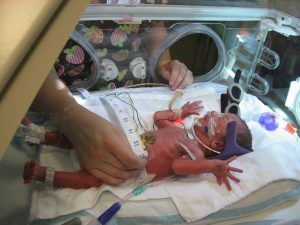
Three pounds and 10 ounces at birth—and down to 3 lbs. 3 oz. at her tiniest—Harper lived at Methodist Hospital for the next 45 days. My husband and I spent so much time visiting her, we were on a first-name basis with the staff at the NICU/IMC. I’m sure this sounds familiar.
Throughout April and May, our world revolved around Kangaroo Care, bilirubin lights, surfactant, reflux, and poop-inducing glycerin drops. We, too, celebrated milestones like being able to hold our little girl for more than a few moments at a time, finally dress her in tiny outfits we’d had to rush out and buy, and feed her from a bottle instead of a feeding tube. Just like you, we marveled at the number of mere ounces our child gained from one day to the next and shuddered at the beeping monitors whenever they alerted us that something—be it oxygen levels, body temperature, etc.—was wrong. Transferring to the IMC (Intermediate Care Unit), moving from an isolette incubator into an open-air crib, and reaching the five-pound mark were nothing short of miracles to us.
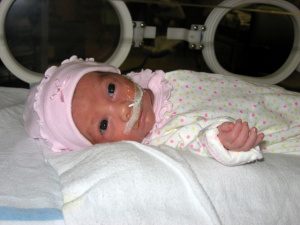
I remember how hard it was, trying to convey to other people the magnitude of “40 ccs” of breast milk or a few tenths of an ounce of weight gain. Bless our friends’ hearts, they were so legitimately concerned for us and our new baby, but try as they may, they could never really understand the significance of 24 hours sans any “episodes” or a self-regulating body temperature. And to be honest, I never would’ve been able to either, had my husband & I not endured everything that we went through with our own daughter. Once you’ve survived the roller coaster ride of having a premature baby, you can’t help but relate to—and feel for—those in the same situation, which I suppose is the main point of this letter.
However, I have many reasons for writing you today, so many things I want to tell you…
(1) Congratulations! The circumstances surrounding your child’s birth may be complicated, but that doesn’t mean that your child’s debut into this world should be any less celebrated. My heartfelt congratulations on the birth of your beautiful baby.
(2) It’s not your fault. When Harper was born early, I remember feeling riddled with guilt. I’m her mother, the very one who’s supposed to protect her, and yet it was because of my blood pressure that she now lay in her isolette with wires stuck to her hands and chest and tubes jammed into her mouth and nose. I was angry with myself, because I felt like my body had failed me. Failed her. But after time and prayers and a lot of conversations with my very logical husband, I came to understand that Harper’s prematurity wasn’t my fault. It’s not like I woke up one day and said to myself, “I’m kinda bored. Let’s just go ahead and get this show on the road. Oh, that’s not good for the baby? Pshhh, whatevs.” Yes, my medical issues were the reason behind her early delivery, but I didn’t choose to have preeclampsia, nor did I have any control over it.
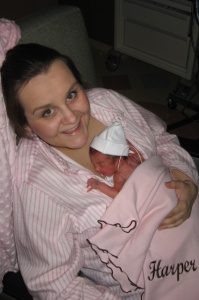
You didn’t do anything to cause your situation, Preemie Mom. Your body’s ability to physically undergo a pregnancy is completely separate from your devotion to your child. Forgive your body and yourself.
(3) You don’t need to be present in the NICU every second. It’s the most helpless feeling in the world: Sitting outside your child’s isolette or open-air crib, staring at her tiny body as she sleeps, your eyes flickering to the overhead monitor as it startles you with an alarm. You can’t pick up your baby when she cries; you can’t feed her when you think she’s hungry; in the beginning, you can merely touch her through a hole in the side of her incubator with a gloved hand. It’s agony.
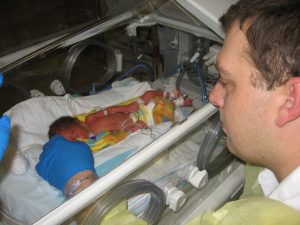
And yet, when you’re anywhere besides the NICU, it occupies your every thought. Cue usual Mom Guilt and multiply it times 100, and that’s how bad you feel about not being there, as though you are somehow abandoning your child by not spending every waking second at the hospital. Preemie Mom, please don’t listen to that nonsense. You can’t—and shouldn’t—spend every moment in the NICU, unable to do much besides sit there and wait and worry. If your baby hadn’t been a preemie and you had brought him/her home with you two days after delivery like most moms, you wouldn’t be spending all of your time staring at him. (Almost, maybe, but not all of it.) You’d put your darling newborn down for a nap in his bassinet, and you’d take a shower, or do the dishes, or take a nap yourself. Would you punish yourself at home for leaving your child’s side to do a load of laundry? No! Then why would you do it just because your child is in the NICU?
I’m not suggesting you simply ignore the fact that your child is in Neonatal Intensive Care. By all means, visit your preemie—and often. Schedule visits around bath times, feedings, Kangaroo Care sessions, etc. so you can be present for the most interactive times with your baby. But do not make yourself feel bad about not being there 24 hours a day. It’s unnecessary.

(4) Be proactive. Odds are, you’ve never been through this before. Odds are, you’re not a doctor or nurse—you’re just a normal mom with no medical training who’s scared to death and has no idea what to expect. That’s why it’s so especially important to be proactive about your child’s care. If the neonatologist is talking about administering surfactant into your baby’s lungs, ask what in the world that is and why it’s necessary. If you’re unsure of how to change your child’s diaper without disturbing her IV, ask a NICU nurse to show you what to do. Ask questions—a LOT of them—even if you feel like a broken record or still don’t understand something after the initial (or second or third or fourth) explanation. You’d be surprised at how much more in control a little bit of knowledge makes you feel.
Also? Take advantage of your unique opportunity to get hands-on instruction from the NICU nurses. Most of them are excellent at teaching new parents how to care for their preemies, but you often have to ask for that direction. Harper’s NICU nurses taught us everything—from how to change her diaper (it’s a lot scarier when you’re dealing with a three-pound baby, trust me!), how to swaddle her, how to recognize when she was having reflux, etc. It was one of the only perks of having a child in the NICU: we had a private, one-on-one training session with a health care professional for our child’s first 45 days of life. In fact, my husband and I now find it completely surreal that if Harper had been born on time, the hospital would’ve simply discharged us a few days later, sans any instructions, tutorials, parenting classes, etc. They would’ve just sent us on our merry way and said, “Figure it out.” Minds = blown.
(5) Be patient but firm with those around you. Take a premature child, stressed-out parents, excited grandparents (and other family members), and concerned friends/coworkers, and what do you get? A lot of raw emotions and a lot of potential for trouble. Having a child in the NICU can create as much family drama as where you’ll spend your holidays—doting family members want their opportunities to hold, see, and feed the baby, not to mention a chance to voice their opinions on your child’s care—but, really, you and your significant other are the parents, and thus you get to make the decisions regarding your precious preemie from here on out. It is not about anyone else but you, your spouse, and your child (and/or his/her siblings). If you need everyone to back off and give you space, tactfully ask for it. However, remember that most people truly have the best intentions. Whether you’re irritated by the fact that your mom coaxed the baby into taking six ounces from a bottle when you could barely get her to swallow a few ccs or you’re annoyed with friends constantly asking, “Sooo, when do you get to bring her home?”—any preemie mom’s most-loathsome question—try to be patient. Most people truly mean well.
(6) People handle stress in different ways. Having a preemie is an incredibly stressful situation, and the ways in which you and your spouse handle it may vary. You may feel angry while your husband feels detached. He may cry more than you’ve ever seen him cry—and that may unnerve you a bit. He may immerse himself in work in an effort to get his mind off of the painful situation at hand while you obsess over the baby. There is no “right” way to cope with such an overwhelming, emotional situation…but to the new mother who has been forced to leave the hospital without her baby, whose post-partum hormones are out of control, and whose husband is now cracking a joke to lighten the somber mood in the NICU, that’s not always easy to remember.
I’ll never forget randomly bawling in the car on the way home from one of our visits to the hospital, about 30 days into Harper’s 45-day stay. Nothing negative had “happened”—in fact, we’d just had a wonderful visit with our daughter, as our evening visit had coincided with “Spa Day” (aka: bath time for the NICU kiddos—a privilege for preemie parents to be included in, because it allows for so much intimate, one-on-one interaction with your incubated baby that you wouldn’t otherwise necessarily get). But even a NICU visit filled with smiles and laughs cannot compete with the throbbing ache that comes with having to leave your child behind and drive home without her. It was all too much for me in that moment in the car, and I erupted into tears. My husband glanced over from the driver’s seat and blankly said, “What’s wrong?”
I looked at him like he had three heads. “What’s wrong is that we’re here and she’s there, and I have no idea when that will change.”
He furrowed his brow. “But today was a good visit,” he started. “We got to give her a bath and do Kangaroo Care and everything?”
Jeff wasn’t being callous or intentionally insensitive—he was just trying to take one day at a time and focus on the good. I was simply overwhelmed by the entire experience and worrying about our lack of a timeline. Both responses are totally understandable.
So, when your spouse reacts differently than you do, try to cut him some slack. You’re both going through an incredibly trying experience together, and it sucks. That said, it’s not a competition as to who is hurting more (or who appears to be).
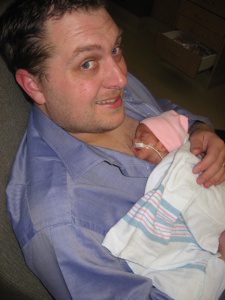
(7) Let others help you. Though only seven of us—myself, my husband, our parents, and my late grandmother—were allowed into the NICU to “oooh” and “ahhh” over Harper in person, an entire virtual world of friends and family kept a watchful eye on my Facebook page for pictures and updates as to her progress. Every day Jeff & I returned to our computers to find countless comments from friends, relatives, acquaintances, and coworkers, each detailing how precious she looked in her latest picture, how happy they were to hear of her progress, and how hard they were praying for her (and us). Random friends whom I hadn’t seen in 10 years emailed me, asking what they could do to help. High-school acquaintances sent me instant messages offering to drive me to the hospital while I was recovering from my C-section. I cannot tell you what a difference this made.
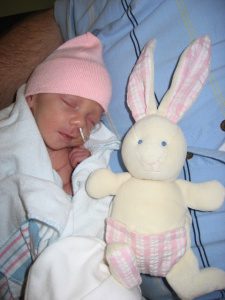
As I wrote in my daughter’s baby book: “Though your visitors may have been limited in number, you were surrounded by hundreds of people watching, praying, and rooting for you. We could literally feel their love and strength, and I have no doubt that you could, too. I think that’s why you’ve always been (and continue to be) so outgoing and friendly to everyone you meet—you must already realize that the kindness of people is a beautiful, special thing, and that every person you meet has the power to change your life for the better if you allow them.”
Lean on people, Preemie Mom. They’re here to help you—even though sometimes they don’t quite know how. All you have to do is ask.
(8) You’re not alone in what you’re going through. Although I may not have lived the details of your circumstances, I do know what it’s like to check out of the hospital as a new mom who must leave her new baby behind, to wonder and worry whether your child will survive, and to be forced to place the most important thing in your entire life in God’s hands. I understand how it feels—all of it—and I promise you, Preemie Mom, that no matter what happens you will make it through this.
In the meantime, talk to other moms who have been (or currently are) in your shoes. As Candice said in her blog post earlier this month, once you’ve had a preemie, you’re officially a lifelong member—albeit an unwilling one—of the NICU Club. Don’t be afraid to reach out to someone you know who has delivered prematurely. Most of us who have lived through this experience can’t help but feel for the Club’s newest recruits.
And, if you need help finding another preemie mom to talk to, contact your local March of Dimes. This amazing charity organization is dedicated to helping moms deliver healthy, full-term babies and offering support when something goes wrong. Local March of Dimes chapters provide many useful resources, including support groups, for parents of preemies.
(9) Strange as it may seem, you will one day look back on this entire experience and give thanks for it. Sounds crazy, I’m sure, but it’s true—and it’s something that the parents of “normal” babies can’t ever fully understand. When the most basic parenting tasks (e.g., diaper changes, baths, feedings, etc.) have been held like ransom, you appreciate them to an entirely different degree. That never goes away, long after you’ve left the hospital. When you’ve survived the experience of having a child in the NICU, it’s never far from your mind that all of this—the getting up in the middle of the night, the fussing, the crying, even the crazy diaper blowouts—is a gift. Getting up at 3:00 A.M. becomes so much easier when you’ve spent months longing for the privilege.
Chin up, Preemie Mom. You have so much to look forward to. My best wishes and most sincere prayers to you and your baby.
Love,
Taylor

[hr]
Was your child born prematurely? If yes, how early? What are your best tips to help other Preemie Moms cope?












One week ago today, we got to bring our son home from a grueling 16 day stay in the NICU. As our fourth son, and yet our first with health problems, everything was new to us…learning to live by the rules of a hospital for my son was such a challenge. Our son wasn’t technically a preemie…he was born 3 weeks early but had a couple of challenging health concerns. I am very thankful for the NICU staff and all of the care given to us. And, yet, being there was one of the most painful, challenging things I’ve done. You are so right when you say that you cannot fully understand the gravity of having a child in the NICU until you have lived it. And, you are so right when you mention the significance of a few cc’s. My life revolved around cc’s, diapers, and doctors reports. Now, our son is at home with us…still on oxygen and a heart/lung monitor but…praise the Lord, he is home.
Incredibly well-written, Taylor! My 26-weeker is now 6, and this post brought back all kinds of memories–positive ones like bath time and kangaroo care, and the painfully raw moments my husband and I spent curled up together in the parent “break room” sobbing about yet another surgery or issue.
One of my favorite resources is Hand to Hold, an amazing non-profit based out of Austin. They have an incredible team of veteran NICU families ready to support families new to the journey.
This is beautiful. I hope it bring comfort to moms who are unwillingly inducted into the NICU club.
Yes, it is pretty wild when the hospital sends you home with a two- or three-day-old baby and NO CLUE. NONE.
I agree with Inga- LOVE this post. And why did the nurses allow me to leave the hospital with that little baby TWO days after I had him? I had NO IDEA what to do!
Well done friend. Love you
Thanks, Candice! I have no idea how you ever did this x 3. You’re my hero. Love you, too.